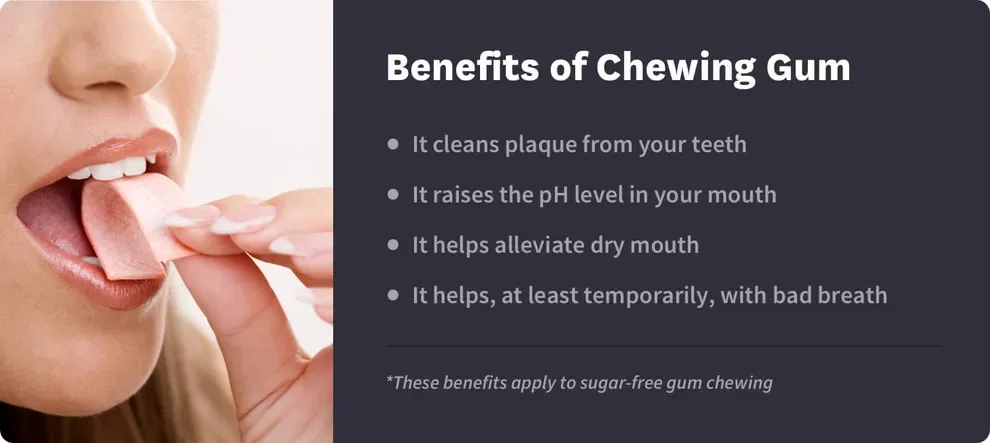Is Chewing Gum Bad for Your Teeth and Oral Health?

Table of Contents
- Is Chewing Gum Bad for Your Teeth?
- Are All Gums the Same?
- Benefits
- Risks
- Does Age Matter?
- FAQs
- References
Many people enjoy chewing gum for fun, and it is usually harmless to do so. In fact, chewing gum can help you improve your oral health. Its benefits come from its ability to stimulate saliva production in the mouth, which protects teeth in several different ways.
But there are also a few risks associated with the habit. Chewing non-sugar-free gum increases the odds of tooth decay. The amount of time you spend chewing gum each day can impact your jaw and its strength over time. And young children and older people are more likely to choke on gum and should not chew it under any circumstances.
Is Chewing Gum Bad for Your Teeth?
It depends. Chewing the wrong type of gum can have negative effects on your teeth. Generally speaking, chewing gum can be beneficial for your oral health.
Like anything in life, moderation is key. You should also be aware of any risk factors that would make chewing gum risky for you or the people in your life.

Does Every Type of Gum Have the Same Effects?
No. Every gum has a slightly different impact on your oral health depending on:
Its flavor. Fruit-flavored gums often contain citric acid, which may lower the pH of the mouth enough to wear down tooth enamel even if the gum is sugar-free.
Whether it has sugar in it. Gums with sugar in them promote tooth decay, but sugarless gums do the opposite.
If it is sugar-free, what type of sweetener is in it. Gums with xylitol in them are doubly beneficial for fighting bacteria and reducing the risk of tooth decay. Other sweeteners do not contribute to tooth decay but also don’t help to fight it.
Whether it is medicated. Some chewing gums contain additional fluoride or a compound called chlorhexidine. These ingredients are extremely helpful for strengthening teeth.
When you chew it. Chewing gum at any time can be helpful, but chewing it right after meals is most effective.
Benefits
Chewing gum has four distinct positive effects on your oral health:
It cleans plaque from your teeth
It raises the pH level in your mouth
It helps alleviate dry mouth
It helps, at least temporarily, with bad breath
Chewing gum reduces the amount of plaque in your mouth in two ways. First, the mechanical act of chewing disrupts any food particles that have settled on your teeth and gums. Each time you chew a piece of gum, that gum rubs against your teeth and pushes particles of plaque out of the way.
Once these particles have been loosened up, your saliva can wash them away. Since chewing gum stimulates saliva production in your mouth, it also helps get rid of those particles so they can’t continue to feed your plaque bacteria and damage your teeth.
Each time you eat or drink, the acidity of your mouth changes. If the pH of your mouth falls below 5.8, your teeth will begin to leech some of their minerals and become vulnerable to decay.
Saliva flow helps to return your mouth’s pH back to neutral levels after these harmful drops occur. Chewing gum stimulates saliva production, making this happen faster than it would. As a result, your teeth spend less time in acidic conditions and become more resistant to erosion and decay.
Some people do not naturally produce enough saliva to keep the inside of their mouth moist. This condition is called xerostomia. It can happen due to:
Genetics
Old age
The side effects of certain medications
Because one of saliva’s purposes is to protect our teeth, a chronic lack of saliva can quickly lead to tooth decay. Chewing gum tells your body to produce more saliva. It can temporarily counteract dry mouth symptoms and reduce the risk of tooth decay and other oral health issues in this population.
It’s important to remember that chewing gum is not a substitute for good oral hygiene practices. It can be beneficial as an additional practice on top of your usual oral health routine, but regular brushing and flossing are still necessary.
Risks to Your Teeth and Jaw
Chewing gum on an occasional basis is unlikely to cause any issues with your teeth or jaw. In fact, it is likely to help you keep your teeth healthy and strong.
However, this might not be true if you chew gum constantly for long periods of time. Evidence suggests that excessive gum chewing may carry some risks for both your teeth and your jaw.
Chewing gum requires active use of your jaw muscles and temporomandibular joint (your jaw joint). Too much chewing may strain these areas, leading to pain, difficulty opening your mouth, and other unpleasant symptoms.
It takes a lot of gum chewing to get to this point, though. In one study, 63% of people who reported chewing gum for over three hours a day reported stiffness in their jaw joint and pain in their face and jaw. Since most people chew for far shorter periods than that, it's safe to say that chewing gum probably won't hurt your jaw.
The impact of excessive gum chewing on teeth is less clear.
There is some evidence to suggest that chewing can slightly increase your rate of tooth wear, especially if you favor one side of your mouth when you do it. However, this effect is minor at best. For the most part, you shouldn’t worry about what chewing gum might do to your teeth. It is far more likely to be beneficial than harmful.
Does Age Matter?
In general, people of any age can benefit from chewing gum for oral health purposes. However, there are some special considerations for people who are very young or very old.
Children
Chewing gum for oral health is not recommended for children under age 4. This is because very young children usually do not understand that they are not supposed to swallow the gum. While ingesting the gum won’t harm them, they may choke on the gum while attempting to swallow it.
After age 4, chewing gum poses no risk to children. Offering your child gum during the day can be a great way to help them keep up their oral hygiene even when they are too busy to brush their teeth.
Seniors
Seniors often experience more oral health issues than the general population, and they may not always be able to brush and floss as thoroughly as they used to. This has led some researchers to investigate whether chewing gum could be a useful tactic to protect seniors’ oral health.
Their findings so far suggest that chewing gum can be extremely helpful for seniors. In one study, chewing medicated gum twice a day for a year offered nursing home residents significant protection against common conditions such as denture stomatitis and angular cheilitis. It also significantly decreased the levels of plaque in their mouths.
However, chewing gum can be as much of a hazard for some seniors as it is for young children. Many older people have decreased muscle control and a weaker gag reflex that makes it hard for them to avoid choking on items in their mouth. They may also have additional conditions such as Parkinson’s disease which also increase their risk of choking.
If a senior is experiencing problems in any of these areas, it is not safe for them to chew gum. Instead, they can use oral health aids like medicated mouthwashes or oral sprays.
Chewing Gum & Oral Health FAQs
Occasional gum chewing can be good for your oral health, as it removes food bits that are stuck in your teeth and encourages saliva production. But a daily gum-chewing habit puts a lot of pressure on your joints.
Researchers say people who chew daily have a higher risk of temporomandibular joint disorder than those who don't chew gum daily.
Gums containing the American Dental Association (ADA) seal are sugarless, so they don't promote cavities. Manufacturers also prove that their products won't harm your dental tissues and that they can boost your health in some way.
Products might reduce acids, for example, or they can help remineralize your enamel. Shop carefully and ensure the product you're about to buy is the best product for your smile.
Some chewing gum products are loaded with sugar. As you chew, your mouth fills with saliva, and bacteria lurking between your teeth come to life. A sugary gum habit can lead to cavities over time.
If your mouth is filled with fillings, implants, braces, and other dental devices, avoid any kind of gum. As you chew, you could weaken or loosen your products and prompt a visit to the dentist.
Sugary gum can damage your teeth’s enamel, resulting in erosion and cavities. Choose sugarless gum to best protect your teeth.
Chewing too much gum can result in headaches, stomach upset, jaw pain, and tooth decay (if you opt for sugar-filled gum). Jaw issues are often triggered by imbalances, as people tend to chew gum on one side of their mouth rather than evenly switching back and forth between sides.
